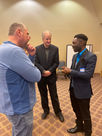Truth in Stories
My earliest memories with stories go back to my dad. Laying on our bellies, we crowded around Hop On Pop, Is Your Mama a Llama?, and Rainbow Fish. My sister and I were captivated by the way our dad’s voice would shift from high to low depending on the character. Stories were not only on the page, though. Frequently we would go on walks along a trail that ended on a bridge. It became known to me and my sister that the bridge indicated the time for our dad to leave us, go under the bridge, and transform into a troll. We would spend the next 30 minutes going back and forth across the bridge while the troll griped at us, warned us not to cross, and told foreboding stories about the other disobedient children who had crossed his bridge. Whether they were created randomly or read from a book, these stories mattered to me. They were the start of my impending bedtime; they shaped my imagination; they developed my love of reading; and they were entertaining.
Certainly these factors contributed to me studying literature in college. By the end of my college career my classmates and I would joke that we were Life majors, instead of English majors. We had read about the human condition: how fickle love is and how inevitable heartbreaks were; the importance of a journey; that women had been fighting for rights far before any of our feminist awakenings. We read about racism and classism. We talked about Roman wars and ethnic wars. We asked ourselves what it meant to live a meaningful life and what was important to us. We had these conversations because the stories prompted us to. Sometimes there would be a story I hated, or a story that my classmates hated. Luckily for us, we were in college and forced to talk about it, anyway. These stories, oddly enough, often turned out to be the most eye opening. After being forced to think about the unrelatable or distasteful character, I would realize that I actually didn’t understand her; and, sometimes, I would realize that my ignorance made me hateful and dismissive of her.
These days I am not reading and analyzing literature every day. Working full time at an adult literacy organization limits my reading window, though it does not limit the stories I take in. I hear the story of the American who has trouble understanding what she reads because she never got the attention she needed for her learning disability; I hear the story of an immigrant who left home for a better job and who misses his sisters back home; I hear the story of a refugee who was shot by the Taliban and is separated from her family. These stories matter to me. They are heart wrenching and they test my imagination. Frequently they undermine my understanding of this “human condition” I thought I knew so much about. However, the stories I hear are important. They allow me to empathize with those who are different from me. They take away my apprehension and let me understand. Whether I am reading for pleasure, or listening to someone’s present situation, I am as captivated by these stories as I was by my father’s transformation into a troll. And in the same way that I knew the bridge signaled the time for my dad’s transformation, I know that stories hold power to open my imagination and understanding.
So despite what might be happening in my day, I always try to fully engage with new people I meet. What are they saying to me? What are their goals and hopes? What have they been through to get to me--the program manager at Blue Ridge Literacy? Sometimes, I might feel rushed and willing to hurry someone out of my office. I run the risk of being impatient and dismissing someone’s story. The most rewarding part of my job, however, is listening to the new people I meet and getting to know them. It is impossible for me to truly dismiss someone if I listen to them long enough, just like it was impossible for me to hate a story once we analyzed it in English class. I hear people from many different countries: the United States, Mexico, Guatemala, Honduras, the Congo, Burundi, South Sudan, Afghanistan, Iraq, Iran, Nepal, Bhutan, China, Japan. Yes, I read the headlines and I hear the news. But the best way to truly know someone, in my experience, is to listen. Listen to their story.








